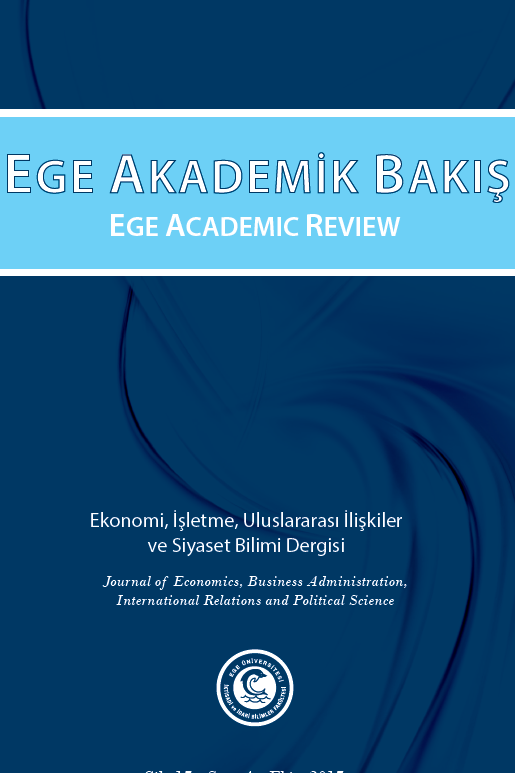Potable Water Quality Prediction Using Artificial Intelligence and Machine Learning Algorithms for Better Sustainability
Potable Water Quality Prediction Using Artificial Intelligence, Water Quality Index, Classification
Potable Water Quality Prediction Using Artificial Intelligence and Machine Learning Algorithms for Better Sustainability
Water Quality Index, Machine Learning, Classification,
___
- Abed, B. S., Farhan, A. R., Ismail, A. H., & Al Aani, S. (2022). Water quality index toward a reliable assessment for water supply uses: a novel approach. International Journal of Environmental Science and Technology, 19(4), 2885-2898.
- Abuzir, S. Y., & Abuzir, Y. S. (2022). Machine learning for water quality classification. Water Quality Research Journal, 57(3), 152-164.
- Ahmed, U., Mumtaz, R., Anwar, H., Shah, A. A., Irfan, R., & García-Nieto, J. (2019). Efficient water quality prediction using supervised machine learning. Water, 11(11), 2210.
- Aldhyani, T. H., Al-Yaari, M., Alkahtani, H., & Maashi, M. (2020). Water quality prediction using artificial intelligence algorithms. Applied Bionics and Biomechanics, 2020.
- Azrour, M., Mabrouki, J., Fattah, G., Guezzaz, A., & Aziz, F. (2022). Machine learning algorithms for efficient water quality prediction. Modeling Earth Systems and Environment, 8(2), 2793-2801.
- Brown, R. M., McClelland, N. I. Deininger R. A. and O’Connor, M. F. (1972). Water Quality Index-Crashing, the Psychological Barrier, Proc. 6th Annual Conference, Advances in Water Pollution Research, pp 787-794.
- Chafloque, R., Rodriguez, C., Pomachagua, Y., & Hilario, M. (2021, September). Predictive Neural Networks Model for Detection of Water Quality for Human Consumption. In 2021 13th International Conference on Computational Intelligence and Communication Networks (CICN) (pp. 172-176). IEEE.
- Dilmi, S., & Ladjal, M. (2021). A novel approach for water quality classification based on the integration of deep learning and feature extraction techniques. Chemometrics and Intelligent Laboratory Systems, 214, 104329.
- Fen, L., Lei, Z., & Ting, C. (2021, November). Study on Potability Water Quality Classification Based on Integrated Learning. In 2021 16th International Conference on Intelligent Systems and Knowledge Engineering (ISKE) (pp. 134-137). IEEE.
- Graf, R., Zeldovich, M., & Friedrich, S. (2022). Comparing linear discriminant analysis and supervised learning algorithms for binary classification—A method comparison study. Biometrical Journal.
- Kaddoura, S. (2022). Evaluation of Machine Learning Algorithm on Drinking Water Quality for Better Sustainability. Sustainability, 14(18), 11478.
- Kadiwal, A. (2022) Water Quality [Dataset]. https://www.kaggle.com/adityakadiwal/water-potability. Accessed on 24 December 2022
- Kaushik, P., Gupta, A., Roy, P. P., & Dogra, D. P. (2019). EEG-based age and gender prediction using deep BLSTM-LSTM network model. IEEE Sensors Journal, 19(7), 2634-2641.
- Liou, S. M., Lo, S. L., & Wang, S. H. (2004). A generalized water quality index for Taiwan. Environmental monitoring and assessment, 96, 35-52.
- Patel, J., Amipara, C., Ahanger, T. A., Ladhva, K., Gupta, R. K., Alsaab, H. O., ... & Ratna, R. (2022). A Machine Learning-Based Water Potability Prediction Model by Using Synthetic Minority Oversampling Technique and Explainable AI. Computational Intelligence and Neuroscience: CIN, 2022.
- Rani, P., Kumar, R., & Jain, A. (2021). HIOC: a hybrid imputation method to predict missing values in medical datasets. International Journal of Intelligent Computing and Cybernetics, 14(4), 598-616.
- National Geographic (2022) Rivers and streams. https://education.nationalgeographic.org/resource/resource-library-rivers-and-streams. Accessed 27 December 2022
- Vapnik, VN (1998) Statistical learning theory. Adaptive and learning systems for signal processing. Communications and Control 2:1-740
- Wang, X., Fu, L., & He, C. (2011). Applying support vector regression to water quality modelling by remote sensing data. International journal of remote sensing, 32(23), 8615-8627.
- Wang, Y., Yuan, Y., Pan, Y., & Fan, Z. (2020). Modeling daily and monthly water quality indicators in a canal using a hybrid wavelet-based support vector regression structure. Water, 12(5), 1476.
- WHO, UNICEF, World Bank (2022) State of the world’s drinking water: an urgent call to action to accelerate progress on ensuring safe drinking water for all. https://www.who.int/publications/i/item/9789240060807. Accessed 02 January 2023
- Xie, G., Zhao, Y., Xie, S., Huang, M., & Zhang, Y. (2019). Multi-classification method for determining coastal water quality based on SVM with grid search and KNN. International Journal of Performability Engineering, 15(10), 2618.
- Xin, L., & Mou, T. (2022). Research on the Application of Multimodal-Based Machine Learning Algorithms to Water Quality Classification. Wireless Communications and Mobile Computing, 2022.
- Zhang, X., Yan, C., Gao, C., Malin, B. A., & Chen, Y. (2020). Predicting missing values in medical data via XGBoost regression. Journal of healthcare informatics research, 4, 383-394.
- Zhu, M., Wang, J., Yang, X., Zhang, Y., Zhang, L., Ren, H., ... & Ye, L. (2022). A review of the application of machine learning in water quality evaluation. Eco-Environment & Health, 1(2), 107:116.
- ISSN: 1303-099X
- Yayın Aralığı: Yılda 4 Sayı
- Başlangıç: 2000
- Yayıncı: Ege Üniversitesi
Asymmetry in Return and Volatility Spillovers Between Stock and Bond Markets in Turkey
Ural Gökay ÇİÇEKLİ, Fatma DEMİRCAN KESKİN, Murat KOCAMAZ
Fetullah BATTAL, Azharsyah IBRAHIM
Systematic Review of Radicalization through Social Media
ÖZEL TÜKETİM VERGİSİ DIŞSALLIK VERGİSİ OLARAK ALGILANIYOR MU? TÜRKİYE ÜZERİNE AMPİRİK BİR ARAŞTIRMA
Alım YILMAZ, Rasim Serdar KURDOĞLU
Relativity Approach to the Strategic Cyber Conflict Management in Businesses
